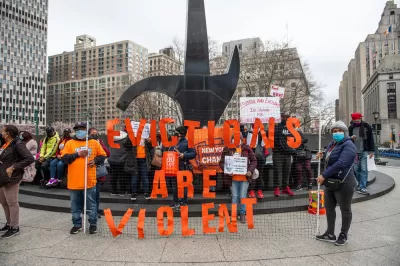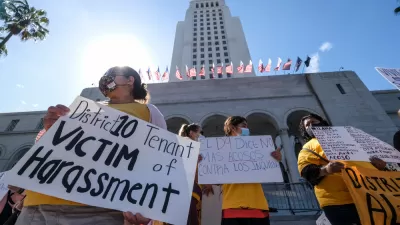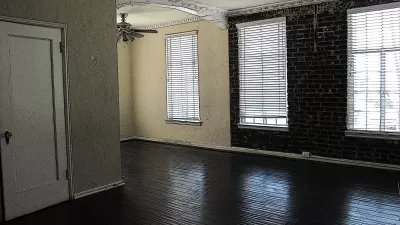Some of the nation’s longest-lasting eviction protections are set to expire in February, while the future of other renter assistance programs remains uncertain.

Los Angeles tenants will no longer be covered under COVID-era eviction protections starting February 1, reports Liam Dillon in the Los Angeles Times. “The decision will end some of the longest-lasting tenant protections in the nation, first passed in March 2020 as part of the emergency response to the COVID-19 pandemic. Since then, landlords have not been allowed to evict their tenants for most reasons, including if the owners wanted to move into their own homes.”
Landlords can also resume raising rents in the city’s 650,000 rent-controlled apartments. “In some cases, renters will be permanently barred from eviction for those old debts, though landlords can try to recover the money in small claims court. In other cases, tenants who are now behind will have at least until August before they can be evicted.”
However, they also must adhere to other new regulations, passed in October. As Dillon explains, “Most notably, landlords would no longer be allowed to evict tenants in any rental property, including single-family homes, unless there was unpaid rent, documented lease violations, owner move-ins or other specific reasons.”
Tenant advocates say continued protections are needed to mitigate the long-lasting effects of pandemic-related job losses and the rise in housing costs in the last few years, while landlords say they need to begin evicting or charging tenants to stay in business.
FULL STORY: L.A. confirms end of COVID eviction rules, while other tenant protections remain in limbo

Study: Maui’s Plan to Convert Vacation Rentals to Long-Term Housing Could Cause Nearly $1 Billion Economic Loss
The plan would reduce visitor accommodation by 25,% resulting in 1,900 jobs lost.

Alabama: Trump Terminates Settlements for Black Communities Harmed By Raw Sewage
Trump deemed the landmark civil rights agreement “illegal DEI and environmental justice policy.”

Why Should We Subsidize Public Transportation?
Many public transit agencies face financial stress due to rising costs, declining fare revenue, and declining subsidies. Transit advocates must provide a strong business case for increasing public transit funding.

Paris Bike Boom Leads to Steep Drop in Air Pollution
The French city’s air quality has improved dramatically in the past 20 years, coinciding with a growth in cycling.

Why Housing Costs More to Build in California Than in Texas
Hard costs like labor and materials combined with ‘soft’ costs such as permitting make building in the San Francisco Bay Area almost three times as costly as in Texas cities.

San Diego County Sees a Rise in Urban Coyotes
San Diego County experiences a rise in urban coyotes, as sightings become prevalent throughout its urban neighbourhoods and surrounding areas.
Urban Design for Planners 1: Software Tools
This six-course series explores essential urban design concepts using open source software and equips planners with the tools they need to participate fully in the urban design process.
Planning for Universal Design
Learn the tools for implementing Universal Design in planning regulations.
Smith Gee Studio
Alamo Area Metropolitan Planning Organization
City of Santa Clarita
Institute for Housing and Urban Development Studies (IHS)
City of Grandview
Harvard GSD Executive Education
Toledo-Lucas County Plan Commissions
Salt Lake City
NYU Wagner Graduate School of Public Service





























